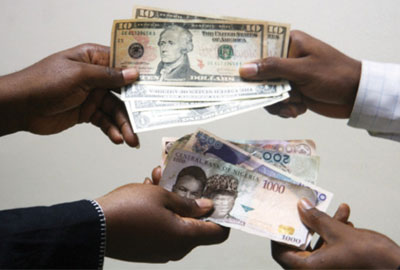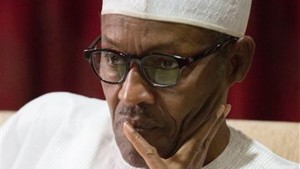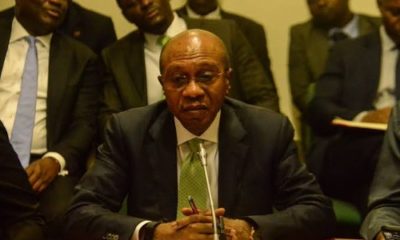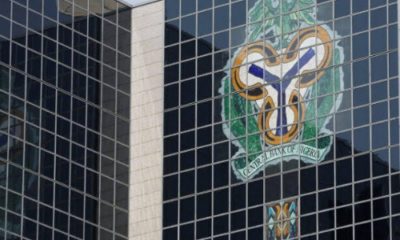Finance
Free fall:Naira depreciates further to N270/dollar in parallel market, as CBN cuts BDC supplies by 66%

By Yemie ADEOYE with Agency reports
LAGOS-THERE seems no end in sight to the ongoing abysmal fall of the Naira against the greenback as the embattled currency depreciated further to N270 per dollar at the parallel market, following reduction of dollar sales to bureaux de change (BDCs) by the Central Bank of Nigeria (CBN).
Investigation revealed that from N260 per dollar at the close of business on Tuesday, the parallel market exchange rate rose sharply to N270 per dollar in Lagos, indicating N10 depreciation.
But in Abuja, the parallel market exchange rate rose from N262 per dollar to close at N273 per dollar, indicating N11 depreciation.
BDC operators, who confirmed this development to newsmen, said that the sharp depreciation was due to further reduction in the weekly dollar sales by the CBN.
President, Association of Bureaux De Change Operators of Nigeria (ABCON), Alhaji Aminu Gwadabe told local media that though the CBN increase the number of BDCs it sold dollars to from 1,170 last week to 2,270 this week, it however reduced the amount of dollars sold to each BDC by 60 percent from $30,000 to $10,000.
According to Mr. Harrison Owoh, Chief Executive Officer, H.J Trust BDC, the decision of the CBN aggravated the demand situation in the market.
“There is huge volume of unsatisfied demand in the market. We had to turn down lots of request for dollars because of there is no dollars to sell to them”, he told Vanguard.
An Abuja based BDC operator, who spoke on condition of anonymity also told local media, “The dollar is selling at N273 in Abuja this evening. It was N262 in the morning. We are surprised at the pace of depreciation, because we can’t explain why it just went up by such margin in one day”.
Commenting on this development, Director, Corporate Communications, Central Bank of Nigeria (CBN), Ibrahim Mu’azu said that the reduction in dollar sales to BDCs is part of the demand management of the CBN in the foreign exchange market. He said that the depreciation of the naira to N270 per dollar is a speculative reaction to the development.
“The rate is not sustainable”, he said. “This is because there are still other windows for end users to buy dollars at lower rate. They can buy dollars at the official rate from the deposit money banks, and from Travelex inside the airport. So by the time people know about these alternatives, the reaction in the parallel market, and the exchange rate will calm down.”
Further investigations reveal that the naira also depreciated heavily against the British Pounds. From N365 per Pounds at the close of business last week, the parallel market exchange rate rose sharply to N385 per Pounds at the close of business yesterday.
In addition to the reduction in dollar sales by CBN, foreign exchange supply from autonomous sources is thinning due to hording. “People are hording their dollars in anticipation of further depreciation of the naira, while some are demanding higher exchange rate before they sell,” said the Abuja based BDC operator.
The anticipation of further depreciation is been driven by speculations that the reduction in dollar sales by the CBN might be followed by outright cancellation of the weekly dollar sales programme which was introduced in 2006. “The naira will hit N300 per dollar, if the CBN cancels the weekly dollar sales, projected the Abuja BDC operator.”
Recall that last week the CBN introduced revised guidelines for BDCs which tightened regulation of BDC operations. Among other things the apex bank banned BDCs from having branch directing them to close all their branches within 90 days. The new guidelines also banned BDCs from having business relationship with street currency hawkers, saying it would revoke the operating license of any BDC with business relationship with street currency hawkers.
Banking
CBN Denies Currency Devaluation

The Central Bank of Nigeria (CBN) has refuted claims of devaluing the.
Earlier reports suggested that the CBN had devalued the Naira, lowering its exchange rate from N631 to the dollar, compared to the previous day’s rate of N461.60 at the Importers and Exporters (I&E) window.
However, the Central Bank of Nigeria (CBN) released a statement on Thursday through its Acting Head of Corporate Communications, Dr. Isa Abdulmumin, categorizing the report as false information.
In the statement titled ‘CBN Has Not Devalued The Naira’, he said the attention of the apex bank was drawn to the news report by an Abuja based newspaper edition of June 1, 2023, titled “CB Devalues Naira To 630/51”.
However, the CBN stated categorically that the news report was replete with outright FALSEHOODS and destabilizing innuendos, ‘reflecting potentially willful ignorance of the said medium as to the workings of the Nigerian Foreign Exchange Market.’
“For the avoidance of doubt, the exchange rate at the Investors’ & Exporters (I&E) window traded this morning (June 1, 2023) at N465/USS1 and has been stable around this rate for a while.
“The public is hereby advised to ignore the news report by Daily Trust in its entirety, as it is speculative and calculated at causing panic in the market,” the CBN spokesman added.
He, therefore, advised media practitioners to verify their facts from the Central Bank of Nigeria before publishing in order not to misinform the public.
Banking
BREAKING: CBN Increases Interest Rate By 0.5%

The interest rate in Nigeria has been raised to 18.5 percent, up by 0.5 percent, from 18 percent where it was pegged in March 2023.
The Central Banks of Nigeria’s (CBN) Monetary Policy Committee (MPC) resolved to this effect at its third meeting of 2023 in Abuja, on Wednesday.
Governor, CBN, Godwin Emefiele, made the disclosure in the communiqué of the MPC’s meeting, thereafter.
While engaging the media at the end of the two-day meeting, Emefiele, said the committee voted to keep the asymmetric corridor at +100 and -700 basis points around the MPR.
In the view of the MPC, rising inflation rate is traceable to the high energy cost and challenges around the supply chain, among others, which lie outside the corridors of the CBN.
Emefiele said, “The current trend in price development would continue to be monitored by the bank with greater collaboration with fiscal authority to address the drivers of inflation.”
Biztellers reports that the CBN had effected six consecutive interest rate increases, which has seen the rate move from 11.5 percent in March 2022 to 18.5 percent in May 2023.
Finance
Dangers Lurk As Nigerians Resort To Refurbished Gas Cylinders

In Nigeria, people have been forced to come up with creative solutions to cope with the effects of inflation and the economic crisis.
These improvised strategies have not only helped individuals save money, but also enabled them to stay afloat during difficult times.
In a concerning development, the recent trend of boycotting the high cost of cooking gas cylinders in Nigeria may pose a greater risk to lives than it does in terms of saving money.
Economy&Lifestyle investigations have revealed that the soaring prices of gas cylinders have reached a point where it has become increasingly challenging for average households to afford them, let alone refill them with gas.
The situation is further exacerbated by the fact that the pump price of kerosene, which would typically serve as an alternative, has become prohibitively expensive.
Upon investigation, it was found that the prices of gas cylinders vary depending on their sizes. A 3kg gas cylinder is priced at N14,000, while a 5kg cylinder costs N16,000. The larger cylinders are even more costly, with a 6kg cylinder priced at N17,000 and a 12.5kg cylinder costing N19,000.
Additionally, the expense continues when it comes to filling these cylinders with cooking gas, as it costs N2,600 for a 3kg cylinder, N5,200 for a 6kg cylinder, N8,950 for a 10.5kg cylinder, and N10,650 for a 12.5kg cylinder.
Consequently, an average household that needs to replace a worn-out 5kg cylinder would have to come up with N20,250 to purchase a new cylinder and fill it with gas, which can be a difficult feat to achieve.
As a result, many people have resorted to refurbishing their old cylinders and trying to use them as best as they can. However, this approach poses a significant danger.
Mrs. Rukayat Adesoji, a trader, shared her experience regarding her gas cylinder, which had become rusted and could no longer stand upright since last month. Due to the exorbitant prices of purchasing new cylinders, she resorted to seeking the assistance of a welder.
The welder patched the legs of the cylinder, repainted it, and ever since then, she has been using the refurbished cylinder for her cooking needs.
She said ““My gas cylinder which was 6kg got rusted and no longer stands erect since last month. When I asked for the price, I was told it was N17, 500. I was discussing it with a friend who advised me to take it to a welder to paint it and construct a new stand. I heeded to her advice and at the end spent just N3, 000 to turn my cooking gas to a brand new.”
Apart from refurbishing cylinders, some people don’t even know when their cylinders will expire. Mrs. Mercy Opara, a hair stylist, falls in that category as she explained: “I am taking my gas cylinder to the welder to spray it for me. It just cost N1, 500.
“The cost of buying a new cylinder is high. I have been using my cylinder for over 7 years and I don’t even know the expiry date. I just pray God blesses me so that I can buy a new one. But this one I am managing will look neat after spraying it for another two years.”
Mr. Adekanbi Joseph, a wielder, said he paints cylinder and “To paint and rebuild a cylinder stand, I charge N4, 500. Many people come here to paint as a new cylinder is now very expensive to get.”
Highlighting the potential dangers of using refurbished cylinders, Mr. Benjamin Hope, the Chief Executive Officer of FKT Cooking gas and general goods, emphasized the risks involved.
He stated that even a brand new cylinder can pose a risk of explosion if the locks are not properly secured after use or if the cylinder filled with gas is moved from one location to another.
He said “A brand new cylinder can explode if the locks are not well keyed after using and if the cylinder filled with gas was moved from one place.
“There are many reasons for the high cost of gas cylinders in Nigeria. One is the cost of importation due to the exchange rate. Another is the increased migration from the use of kerosene to cooking gas which has necessitated increased demand for gas cylinders. You know that in such a case there will be increased importation of cylinders.”he added



















